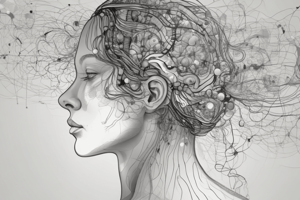Podcast
Questions and Answers
What is the highest virtue according to Aristotle?
What is the highest virtue according to Aristotle?
Courage
Who is considered a philosopher-king according to Plato?
Who is considered a philosopher-king according to Plato?
- A law enforcer
- A ruler who possesses wisdom (correct)
- A merchant
- A military leader
Plato believed that the body was essential for knowledge and wisdom.
Plato believed that the body was essential for knowledge and wisdom.
False (B)
Match the following elements of the soul with their characteristics:
Match the following elements of the soul with their characteristics:
The goal of life in Aristotle's philosophy is known as _____
The goal of life in Aristotle's philosophy is known as _____
What does the term 'In medio stat virtus' mean?
What does the term 'In medio stat virtus' mean?
According to Socrates' views, ignorance leads to what?
According to Socrates' views, ignorance leads to what?
Aristotle believed that body and soul are independent.
Aristotle believed that body and soul are independent.
Flashcards are hidden until you start studying
Study Notes
Philosophical Foundations
- Socrates viewed democracy as hypocritical and emphasized the role of ignorance in leading to injustice.
- Plato, once a student of Socrates, condemned the injustices faced by his teacher and advocated for a meritocratic government led by philosopher-kings.
- The Socratic Method promotes understanding through dialogue and introspection rather than rote memorization.
Virtue and the Soul
- According to Plato, the soul has three key elements that inform virtues and societal roles:
- Reason (wisdom) – associated with rulers and philosophers.
- Spirit (courage) – linked to defenders such as soldiers.
- Appetite (temperance) – related to providers like merchants.
- Plato believed that the soul’s virtues define one's role in society and that rulers should have extensive education and experience.
Body and Soul: Aristotle’s Perspective
- Aristotle proposed an interdependent relationship between body and soul, suggesting a composite nature where both work together.
- He emphasized the concept of potentiality and actuality, arguing that ideas are perfect while physical forms are not.
- The soul is categorized into:
- Rational Soul (intellect and reasoning) – unique to humans.
- Irrational Soul (emotions and basic functions) – shared with other living beings.
The Pursuit of Eudaimonia
- Aristotle defined the goal of life as 'eudaimonia,' which involves realizing one's potential through virtuous living.
- Virtue is characterized by finding balance between excess and deficiency, with courage being the most significant virtue as it enables the pursuit of this balance.
- In medio stat virtus – emphasizes moderation in all aspects of life.
Christian Perspective on Body and Soul
- Humans are seen as reflections of God's image, comprising body, soul, and spirit.
- This triad facilitates relationships with self, others, God, and the environment, highlighting the interconnectedness of existence.
Body as Limit and Transcendence
- The importance of the body in fulfilling life goals underscores the need for courage to act and achieve potential.
- Ordinary tasks, like operating an elevator, can reflect one's personality and attitude, emphasizing the significance of small actions in transcending limitations.
- Artistic expressions symbolize that divine presence is active in the lives of ordinary people, aligning with the belief that Jesus empathizes with human experiences.
Group Activity Instructions
- Students are to create a Tanaga or haiku reflecting the lives of selected individuals, incorporating both English and Filipino.
- The performance should include recitation and choreography, rewarding creativity and adherence to rubrics on content, performance, and props.
Studying That Suits You
Use AI to generate personalized quizzes and flashcards to suit your learning preferences.




